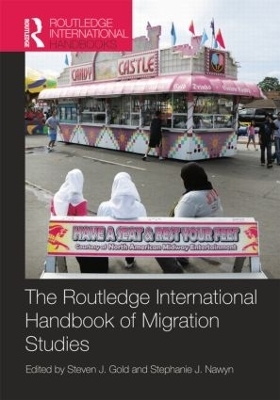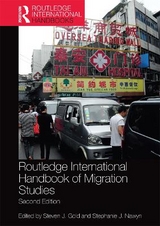
Routledge International Handbook of Migration Studies
Routledge (Verlag)
978-1-138-78773-5 (ISBN)
The Handbook of Migration Studies offers a conceptual approach to the study of international migration, exploring clearly the many modes of exit, reception and incorporation which involve varied populations in disparate political, economic, social and cultural contexts. How do these movements also facilitate the transmission of ideologies and identities, political and cultural practices and economic resources? Uniquely among texts in the subject area, the Handbook also provides a section devoted to exploring methods for studying international migration.
Featuring forty-seven essays written by leading international and multidisciplinary scholars, the Routledge International Handbook of Migration Studies offers a contemporary, integrated and comprehensive resource for students and scholars of sociology, politics, human geography, law, history, urban planning, journalism, and health care.
Steven J. Gold is professor and graduate program director in the Department of Sociology at Michigan State University. His interests include international migration, ethnic economies, qualitative methods and visual sociology. The past chair of the International Migration Section of the American Sociological Association, and the International Visual Sociology Association, Gold is the author, co-author or co-editor of six books, including The Store in the Hood: A Century of Ethnic Business and Conflict (Roman and Littlefield, 2010). Together with Rubén G. Rumbaut, he is the editor of The New Americans book series from LFB Publishers. Stephanie J. Nawyn is an assistant professor in Sociology at Michigan State University. Her research and teaching areas of expertise are in gender and immigration, with a focus on forced migration, families, and social incorporation. Dr. Nawyn conducts research on community development among immigrants and the importance of social networks and social capital to immigrant and refugee incorporation, as well as the socioeconomic advancement of African-born immigrants in the United States.
Introduction Part 1: Theories and Histories of International Migration 1. Economic Perspectives on Migration 2. The Day After Tomorrow: Migration and Climate Change 3. Psychological Acculturation 4. European Migration History 5. Migration History in the Americas 6. Asian Migration in the Longue Durée 7. Charting Refugee and Migration Routes in Africa Part 2: Refugees and Forced Migrants 8. Forced Migrants: From the Politics of Displacement to a Moral Economy of Reception 9. Refugee Resettlement Policies and Pathways to Integration 10. Human Trafficking Part 3: Migrants in the Economy 11. Unions and Immigrants 12. Middleman Entrepreneurs 13. Twenty-First Century Trends in Highly Skilled Migration Part 4: Intersecting Inequalities in the Lives of Migrants 14. The Changing Configuration of Migration and Race 15. New Directions in Gender and Immigration Research 16. Host Hostility and Nativism 17. Immigrants and Residential Segregation 18. Sexualities and International Migration 19. Migrants and Indigenous Nationalism Part 5: Creating and Recreating Community and Group Identity 20. Panethnicity 21. Understanding Ethnicity from a Community Perspective 22. Religion on the Move: The Place of Religion in Different Stages of the Migration Experience Part 6: Migrants and Social Reproduction 23. Immigrant Language Acquisition: An International Review 24. Connecting Family and Migration 25. Immigrant Intermarriage 26. Prospects for the Children of Immigrants in the Twenty-First Century 27. International Adoption Part 7: Migrants and the State 28. The Political Sociology of International Migration: Borders, Boundaries, Rights and Politics 29. Regulation, Recruitment and Control of Immigration 30. Undocumented (or Unauthorized) Immigration 31. Migration and Health 32. Micro- and Macro-Explanations of Naturalization 33. Immigration and Education 34. Emigration and the Sending State 35. Immigration and the Welfare State in Western Societies: Ethnic Heterogeneity, Redistribution and the Role of Institutions Part 8: Maintaining Links across Borders 36. The Historical, Cultural, Social and Political Backgrounds of Ethno-National Diasporas 37. Transnationalism 38. Return Migration Part 9: Methods for Studying International Migration 39. Census Analysis 40. Surveys and Ethnosurveys 41. Making Sense of the Other: Ethnographic Methods and Immigration Research 42. Interviews 43. Considering Time in Analysis of Migration 44. Using Photography in Studies of International Migration 45. The Challenges of On-Line Diaspora Research 46. Comparative Methodologies in the Study of Migration 47. Action Research with Immigrants: Working with Vulnerable Immigrant Communities
| Reihe/Serie | Routledge International Handbooks |
|---|---|
| Zusatzinfo | 21 Tables, black and white; 7 Line drawings, black and white; 2 Halftones, black and white |
| Verlagsort | London |
| Sprache | englisch |
| Maße | 189 x 246 mm |
| Gewicht | 960 g |
| Themenwelt | Naturwissenschaften ► Geowissenschaften ► Geografie / Kartografie |
| Sozialwissenschaften ► Soziologie ► Empirische Sozialforschung | |
| Sozialwissenschaften ► Soziologie ► Spezielle Soziologien | |
| ISBN-10 | 1-138-78773-6 / 1138787736 |
| ISBN-13 | 978-1-138-78773-5 / 9781138787735 |
| Zustand | Neuware |
| Haben Sie eine Frage zum Produkt? |
aus dem Bereich



